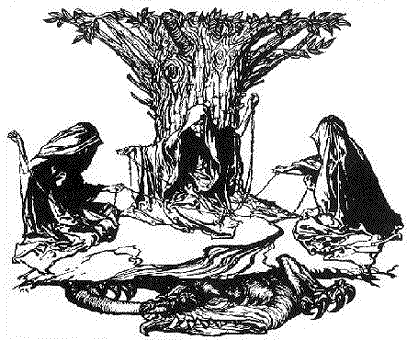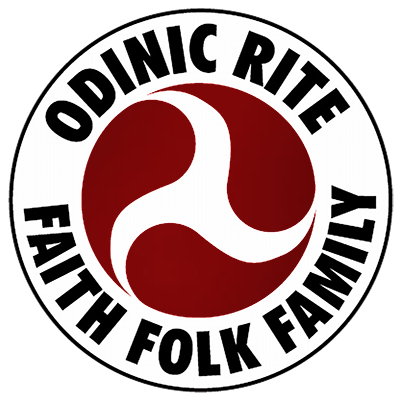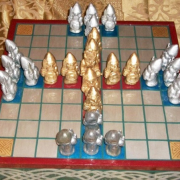Wyrd
The Gods and Goddesses of Odinism
Copyright © 1996 The Circle of Ostara
Published with the kind permission of the Circle of Ostara.
This article must not be republished or reprinted
in whole or in part without their express written permission.
We live in an infinite and eternal cosmos that contains everything that exists, both matter and spirit, a cosmos that is “intelligence”, “awareness” and “will” that brings about all change. This Great Being, of which we are a part, we see as Wyrd, the weaver of Fate. Physical science which once saw the universe as a great but mindless machine, is now coming to realise that the infinite flow and surge of energy that is the basis for the cosmos in every respect is more like a great thought than a machine. The thinker of this thought, the Cosmic Mind, we visualise as Wyrd.
In the mythology of our Nordic ancestors of the past two millenia she plays a shadowy part. By the time the few references we have to her were written down (references saved from the wholesale destruction of our heritage) most of the lore and wisdom of the ancient Aryans had already dwindled into simple folk-tale and legend. She is seen in these tales as the Mother of the Norns, the goddesses of Time: Urd (Wyrd’s namesake), past; Verdandi, present; and Skuld, future, who spin the destinies of men and women.
This idea, of a destiny shaped and controlled by powers distant from the human world, has led in some cultures to a kind of fatalism, a deadening of purpose. It has given rise to the notion that “our fates are sealed”, that we can do nothing to alter them, that we are the helpless playthings of Fate. In India, for instance, where this old Aryan idea of “karma” was influenced by the racial unconscious of another human strain, it led to a passive acceptance of anything life brings and inevitably to stagnation.
Similarly, the old vikings believed that the time of their death was fixed by Fate. Their reaction was different, however. They would go into battle and fight with joy and abandon, thinking that they would not be slain until the time for it arrived.
In our own times the idea of “fate” is often a discouraging notion that all ambition and hope for the future is a waste of time. A kind of dispairing hedonism develops from this, the feeling that only pleasure, physical sensation and oblivion in a haze of drugs or alcohol can blot out the fear of death, inevitable doom and a conviction that to die is to perish utterly. The lives of those who hold this attitde are dominated by this fear of death and the future, they become obsessed with their state of health, consult horoscopes in the daily papers and experiment with drugs that they hope will remove their fear. And yet, for us who can perhaps see a little more clearly, the future holds a bright promise.
We must keep before us the truth that we, body and spirit, are part of the Cosmic Mind, the cosmic thought, the great Web of Wyrd. Within this cosmos there is no death, only change. It is true that Wyrd weaves the pattern of being, but she is not outside the web, a manipulator of destiny. She is herself the web – and the pattern consciously weaves itself – our lives are the thread of it. But we, within the pattern, are creatures of Spirit and Will. We were created so in order to see to the fulfillment of our own destinies, something that may encompass many lives, many rebirths.
We should always remember that the Cosmic Mind has given us our talents and our will, that the gods who shaped us are also a part of the pattern. If we work to fulfill our lives in the direction our natural powers and instincts indicate then we realise our destiny in this life. The Will of Wyrd is our “true will”.



 Hengest Thorsson
Hengest Thorsson